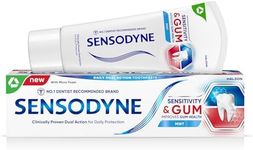Buying Guide for the Best Sensitive Toothpastes
Choosing the right sensitive toothpaste can make a significant difference in your oral health and comfort. Sensitive toothpastes are specially formulated to help reduce discomfort caused by sensitivity to hot, cold, sweet, or acidic foods and drinks. When selecting a sensitive toothpaste, it's important to consider the specific needs of your teeth and gums, as well as any additional benefits you might be looking for, such as whitening or cavity protection.Active IngredientsActive ingredients in sensitive toothpastes are crucial because they help to block the pathways to the nerves in your teeth, reducing sensitivity. Common active ingredients include potassium nitrate and stannous fluoride. Potassium nitrate works by calming the nerves in your teeth, while stannous fluoride helps to strengthen enamel and protect against cavities. If you experience mild sensitivity, a toothpaste with potassium nitrate might be sufficient. For more severe sensitivity, stannous fluoride could be more effective. Consider your level of sensitivity and any additional dental concerns when choosing the active ingredient.
Fluoride ContentFluoride is important in toothpaste because it helps to prevent cavities and strengthen tooth enamel. Sensitive toothpastes often contain fluoride to provide these benefits while also addressing sensitivity. The fluoride content can vary, with some toothpastes offering higher concentrations for enhanced protection. If you are prone to cavities or have weakened enamel, a toothpaste with higher fluoride content might be beneficial. For those with less concern about cavities, a standard fluoride level should suffice.
Whitening PropertiesWhitening properties in sensitive toothpastes can be a desirable feature for those looking to maintain or enhance the brightness of their smile. These toothpastes often contain mild abrasives or gentle whitening agents that help remove surface stains without aggravating sensitivity. If you are interested in whitening, look for a sensitive toothpaste that specifically mentions whitening benefits. However, if your primary concern is sensitivity, you might prioritize other features over whitening.
FlavorFlavor is an important aspect of toothpaste because it can affect your overall brushing experience and encourage regular use. Sensitive toothpastes come in a variety of flavors, from minty to fruity, to cater to different preferences. If you have a strong preference for a particular flavor, or if certain flavors irritate your mouth, choose a toothpaste that aligns with your taste. A pleasant flavor can make brushing more enjoyable and help ensure you stick to your oral care routine.
TextureTexture refers to the feel of the toothpaste in your mouth, which can influence comfort and effectiveness. Sensitive toothpastes may have a smoother texture to avoid irritating sensitive areas. Some people prefer a thicker paste for a more substantial feel, while others might like a gel-like consistency for a lighter experience. Consider what texture feels best for you and whether it contributes to a soothing brushing experience.


















